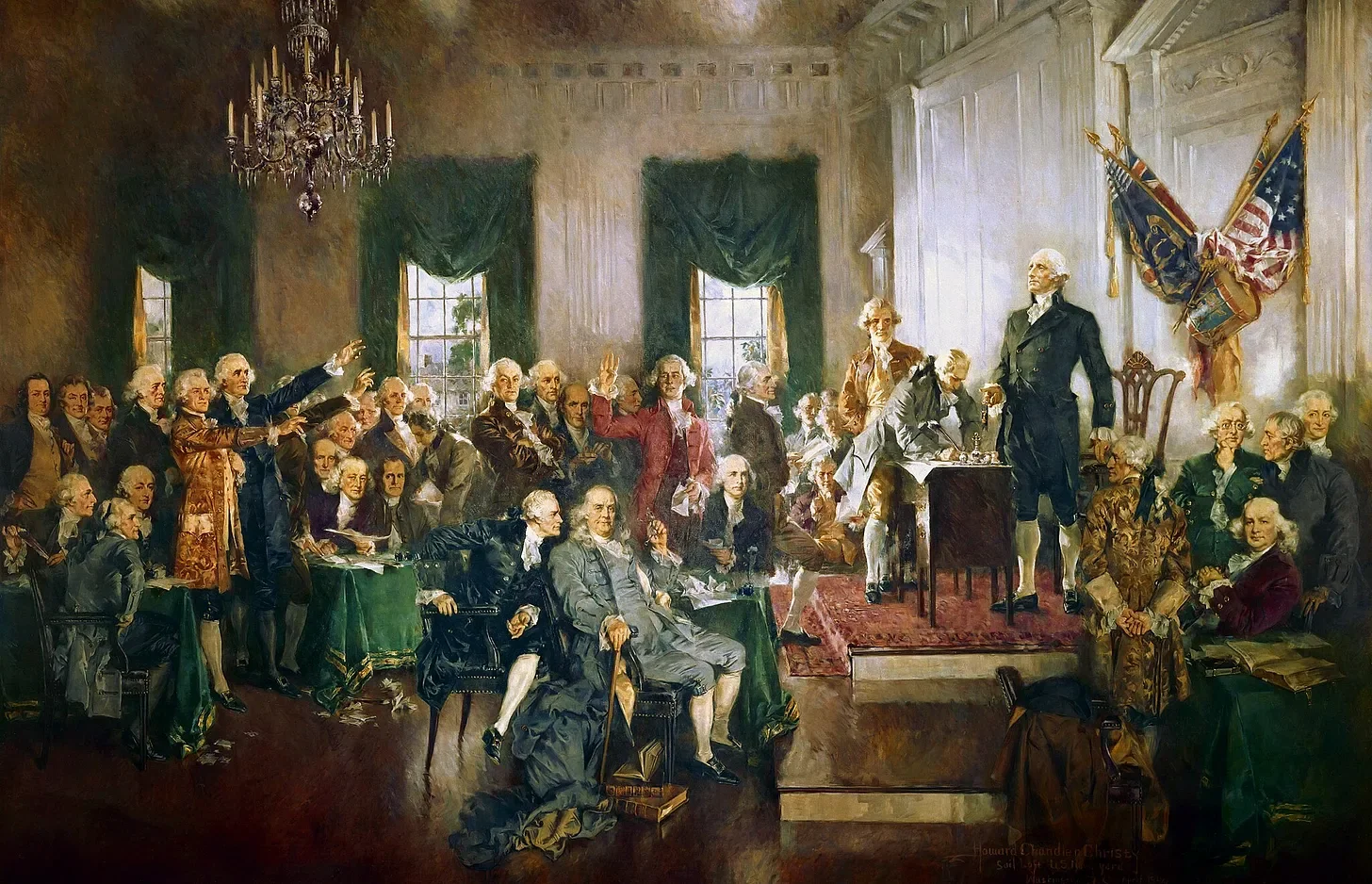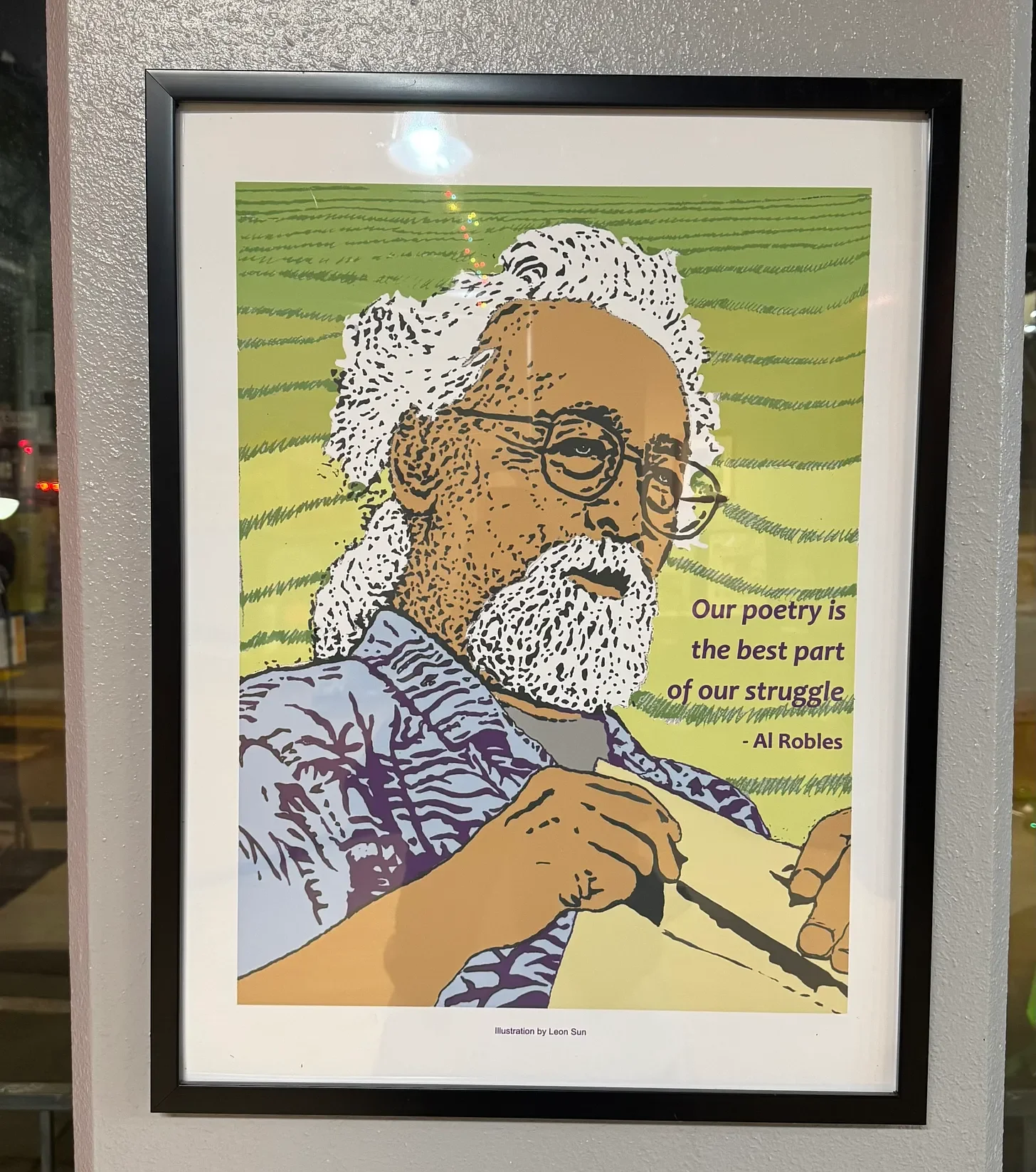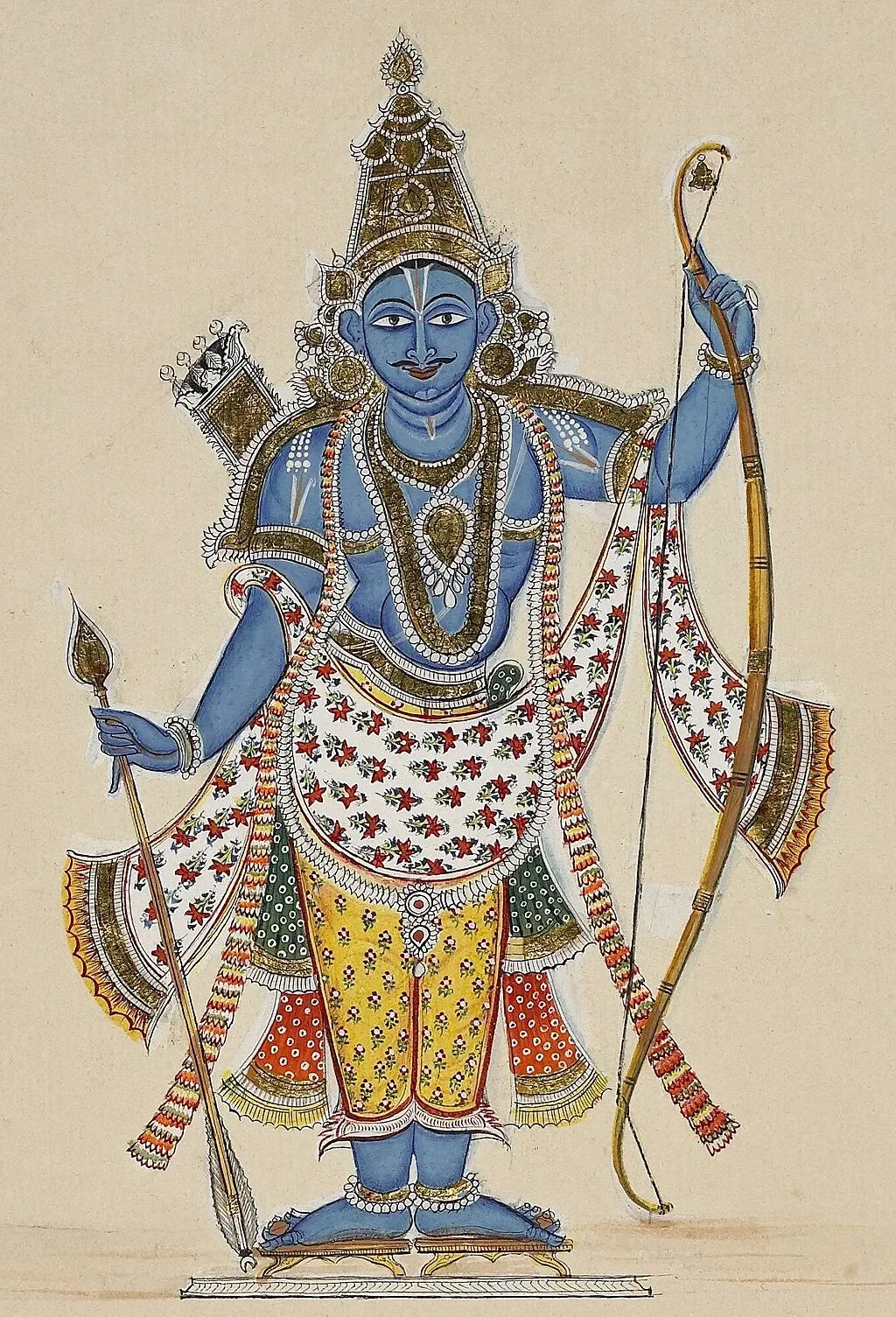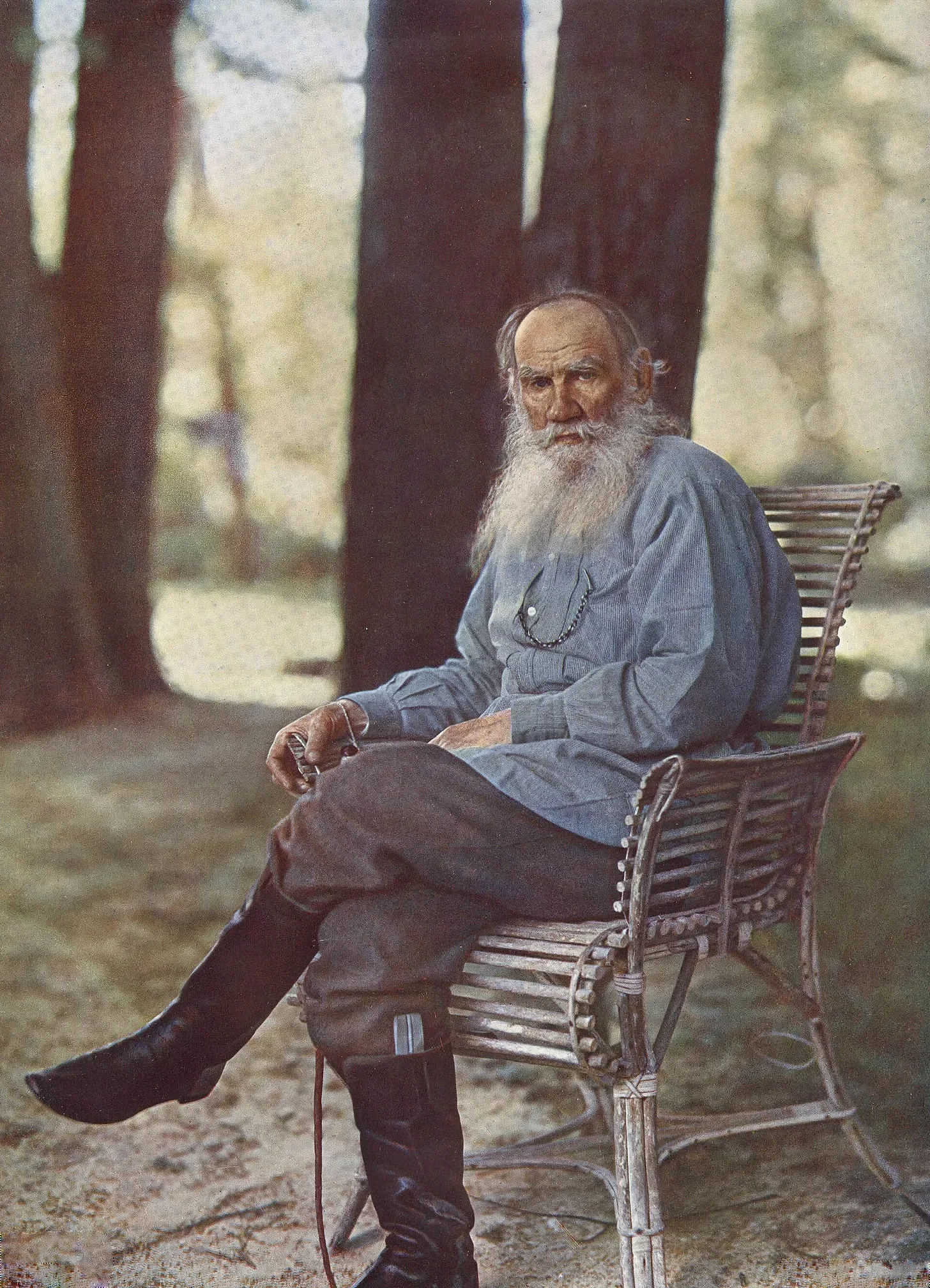We All Have a Little Zohran in Us
Signing of the U.S. Constitution with George Washington, Benjamin Franklin, and Alexander Hamilton (left to right in the foreground), painting by Howard Chandler Christy (Wikimedia Commons)
It is with great hesitation that I write about patriotism. Here I am, a thirty-one-year-old woman with the capacity to carry only a Labrador, attempting to lift an entire elephant. But it’s election night in America, and the elephant in the room is calling my name. I must lift it. Or at least lift its trunk.
In my life thus far, I have had little exposure to true patriots, but patriotism is an inescapable aspect of American life. I have voted, volunteered for political campaigns, pledged allegiance to the flag, and stood for and sung the national anthem. But am I an American patriot? Who is? Is the meaning of patriotism static?
This evening - of all evenings - is a night of patriotism even if, for many, it feels like the night of rebellion. Is the new American patriot the man who New York City has elected as Mayor? The man now at the center of a city at the center of a country that remains the center of the world.
Far away on the West Coast, where I live, the patriotic fervor of Silicon Valley vibrates at a different frequency than Mr. Mamdani. There is, as of late, a performative strain of patriotism spearheaded by PayPal Mafia members and technology leaders like Marc Andreessen and Ben Horowitz. Technology branding has pivoted from the pro-democratic patriotism of the 2010s to an era of “defense” technology or “American dynamism,” which is another way of saying technology for war. It is the patriotism of capitalists that seeks to invent wars in order to sell weapons.
The hawk is the patriot and a dove is, well, a communist most likely. It’s us-versus-them, with them being China. And maybe “them” is Mr. Mamdani as well.
But I am not so cynical, dear reader. I still believe that the true American patriot is the pacifist and peace-lover. The citizen who criticizes her country because she loves it, as James Baldwin once said. They are those who want to build the infrastructure for an educated, healthy, and egalitarian society. Democracy-mongers, if you will.
The hawkish apparatus in the Valley is sinister, but as I shake off both the heebie-jeebies and the pageantry of power-grubbing technologists, I wonder, can I pledge allegiance to the flag if the flag stands for the people?
THE POWER OF STORYTELLING
The story we have all been watching unfold in New York is literary. It is clever, complex, imaginative, courageous, and deeply human. Unlike literature, it is also storytelling with great immediate value. The Mamdani story has proven, to me at least, that democracy is alive and well. Decisions about who leads us are not made in smoky backrooms, but in the thirteen miles one might walk from the southern end of Manhattan to the northern tip. It is storytelling that might actually, hopefully, change the lives of people without the time to read. Tonight and in the days to come, we celebrate a modern American story, but it is also connected to American stories we have been telling for a long, long time.
Depending on who you ask, the history of the United States is either a tale of net heroism or net wrongdoing. I wonder if we have forgotten that within heroism there are heroes, anti-heroes, and tragic heroes. This is why Nikole Hannah-Jones’ 1619 Project, published in 2019, is so fantastic and necessary. It exploded ideas discussed in labyrinthine leftist spaces into public consciousness and gave birth to a new American story. One in which White protagonists are mostly anti-heroes and Black protagonists are a mix of heroes and tragic heroes.
The 1619 Project is one example of how the American imagination changes with storytelling. It was slightly preceded and followed by other wildly popular creative efforts, such as Ta-Nahesi Coates’ “Black Panther” and “Captain America” comic series, and award-winning novels like “The Trees” by Percival Everett.
Today, we are in a cultural moment where the story itself is picked apart. The left has been accused of taking historical revision “too far” and telling stories which alienate the “Americans who built this country”, but one need not read further than “People’s History of the United States” by Howard Zinn to know that leftist ideology is founded on the idea that most of us contributed to building the country, regardless of race. It was a select powerful few who architected division among us, benefited from racialized capitalism, and abandoned the collective.
Debates around Americanness came to a head in 2024 when we re-elected the man who started the birther movement, a conspiracy theory-fueled campaign predicated on President Obama’s unAmericanness. We, as a country, very intentionally did not elect the bi-racial daughter of immigrants.
In her long-form essay “The Idea of America” Hannah-Jones writes about her father who always flew the American flag outside their house because he felt that Black Americans have every right to claim the prosperity and success of the American project.
“He knew that our people’s contributions to building the richest and most powerful nation in the world were indelible… Profits from black people’s stolen labor helped the young nation pay off its war debts and financed some of our most prestigious universities. It was the relentless buying, selling, insuring, and financing of their bodies and the products of their labor that made Wall Street a thriving banking, insurance, and trading sector and New York City the financial capital of the world… Black Americans have also been, and continue to be, foundational to the idea of American freedom… It is we who have been the perfecters of this democracy.”
A picture I took at the International Hotel, a historic site and affordable housing building for elderly Asian residents of San Francisco.
PERFECTERS OF DEMOCRACY
When Mr. Mamdani proudly speaks in Arabic or puffs his chest out and tells Muslim-Americans that they are not only welcome in New York City, they are part of it, I see someone trying to perfect democracy, not undermine it. When he speaks openly about the dehumanization of Palestinians and the destruction of Gaza, I see someone trying to perfect democracy, not undermine it. President Biden might have run the first leg of a relay in which we “fight for the soul of the nation”, but the leader I see grabbing the baton is not the anointed Vice President Harris or any other establishment Democrat. Hopefully, Mr. Mamdani and Mr. Chakrabarti complete their handoff.
I asked at the start of this essay a fundamental question: To what do I pledge allegiance? In our Declaration of Independence, it is written that ‘‘all men are created equal’’ and ‘‘endowed by their Creator with certain unalienable rights”. The operating word here being all. All Americans, regardless of race, gender, religion, class, or ability, deserve ‘‘Life, Liberty, and the pursuit of Happiness”. If that, to you, is a radical idea, then Mayor Mamdani, and all of us who throw our support behind his movement, might be radical patriots ourselves.
THE INDIAN CONTEXT
I want to fly away from America for a minute and look at patriotism in India, a beast I do not pretend to understand, but a perspective I am continually learning about.
Arundhati Roy, a beautiful writer and someone I trust on the subject, has been a vocal critic of Hindu Nationalism and the ruling Bharatiya Janata Party (BJP) for decades, and it was her recently published memoir “Mother Mary Comes to Me” that made me feel gravely serious about the insanity of patriotism. She writes about the 2002 Gujarat riots, cited by many scholars as a pogrom where Muslims, including Muslim political leaders like Ehsan Jafri, were hacked to death and burned. I have known about the 2002 Gujarat Riots ever since Modi was elected Prime Minister of India. He was Chief Minister of Gujarat in 2002, and many accused him of abandoning his Muslim constituents and, in fact, tacitly encouraging the riots. Reading Roy’s reporting on the riots was difficult. It was difficult because I didn’t want to believe that such violence could happen in a place I love so much and in the name of Hinduism.
Lord Rama (Wikimedia Commons)
Since 2012, I have been volunteering at a Hindu ashram for orphans in Udupi - my mother’s hometown in South India - and our greeting at the ashram is “Jai Sri Ram” and when we depart, we say “Ram Ram”. How could someone cut off the arms and legs of a living, breathing human being while saying “Jai Sri Ram”? A greeting of peace that I have said to small, abandoned children. How can that be? My brain screams in terror.
I know the term “patriot” can be the armor for foot soldiers of hate, so it is not without great hesitation that I use the term “patriot” to describe myself. Well, actually, forget about me, but think of the public high school teacher, a nurse who comforts sick pregnant women, or a local government bureaucrat who somehow, someway ensures people get their SNAP benefits; I want the word “patriot” to apply to them. Certain words contain volumes of stories. In a time where we fight ethno-nationalism in defense of civic nationalism, “patriot” includes an entire ocean.
IN CONCLUSION
Leo Tolstoy (Wikimedia Commons)
“The greater the state, the more wrong and cruel its patriotism, and the greater is the sum of suffering upon which its power is founded,” said Leo Tolstoy, an artist living in tsarist autocratic Russia and author of “War and Peace”.
As the parable goes, various blind men feel different parts of an elephant and identify it not as one truth but as many different possibilities. Between the three of us, we may conclude, exuberantly, that we know it to be a snake, a spear, or a wall. We mistake the small part we see for the entire creature, but the wisest among us knows deep down, uncomfortably so, that even though we are so sure of what we are touching, it is still quite possible that we are blind.
*This article is being reproduced with permission. See the original article on Substack.
*The opinions of contributing writers are their own and do not necessarily represent the views of We Are One Humanity. Submissions offering differing or alternative views are welcome.




